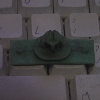This is kind of a safety issue that I've noticied a few companies are having. My brother bought some Eagle Alloys for his Ranger and had them installed at the shop I work at (I didn't work on it thankfully). Anyhow, few months pass and he was coming home from college and his right rear wheel almost fell off. The lugs somehow backed off. Now - there's no hard evidence that it was because of the wheels needing to be retorqued - but what makes it harder is that he was up at Virgina Tech the day before with a damn UVA sticker in his back window. Pranksters - maybe? Anyhow, so he bought a new wheel and he was good to go.
Months later I had to go to a 4wd shop and get some lug nuts and I noticed at the bottom a disclaimer:
So this is more or less a question with a tip - Be sure to retorque your wheels with new wheels (I'd retorque them atleast twice). But has anyone else ran into a problem like this?
My story: I have had my American Racing Diamond Backs for awhile and I've never had to retorque them and when I take the lugnuts off they are always tight as their suppose to and if I do retorque them they already click at 100ft lbs.
Reason I'm asking: I just put some new '03 Cobra wheels on my girlfriends mustang (click here for pictures) and I don't want her wheel(s) to fall off going down the highway in Richmond. I plan on retorqueing them no matter what just to play it safe, but I was just wondering if anyone else has any horror stories because of not re-torqueing.
-Drew
Months later I had to go to a 4wd shop and get some lug nuts and I noticed at the bottom a disclaimer:
Disclaimer: After 100 miles, please re-torque new wheels
So this is more or less a question with a tip - Be sure to retorque your wheels with new wheels (I'd retorque them atleast twice). But has anyone else ran into a problem like this?
My story: I have had my American Racing Diamond Backs for awhile and I've never had to retorque them and when I take the lugnuts off they are always tight as their suppose to and if I do retorque them they already click at 100ft lbs.
Reason I'm asking: I just put some new '03 Cobra wheels on my girlfriends mustang (click here for pictures) and I don't want her wheel(s) to fall off going down the highway in Richmond. I plan on retorqueing them no matter what just to play it safe, but I was just wondering if anyone else has any horror stories because of not re-torqueing.
-Drew













